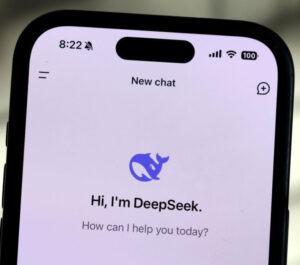DeepSeek AI is the latest competitor in the fight for artificially intelligent chatbot development.
A relatively small startup from China, DeepSeek has made massive waves on a worldwide scale after its introduction. It quickly became the most downloaded free app on the U.S. app store, and that success has flipped the market on its head.
DeepSeek’s intrigue comes from its efficiency in the development cost department. The same behaviors and skills observed in more “advanced” models of artificial intelligence, such as ChatGPT and Gemini, can also be seen in DeepSeek.
However, DeepSeek was produced while only spending a fraction of the money used by its competitors. This has presented a challenge to what the industry presented as necessary for development of quality AI.
Perhaps DeepSeek has shed some light on the corruption present in the U.S. companies which are heading our development of artificial intelligence.
Multi-billion dollar companies spreading misinformation to bolster their stocks aside, the real concerns with DeepSeek AI come from the front of Cybersecurity.
It has been confirmed that DeepSeek’s platform has the capability, within its code, to transmit user data across mobile servers.
This was where the worries that the release of DeepSeek was a way for China to gather information on the U.S. truly gained their footing. Due to this worry, a bill has been put forward that suggests the banning of DeepSeek AI across all federal devices.
Despite these security concerns, many prominent players in the development of technologies have expressed seeing promise in the low-cost approach to artificial intelligence development that DeepSeek utilized.
The availability of cheaper artificial intelligence, paired with the evident willingness to spend an immense amount of money on the development of artificial intelligence bodes well for future advancement of it.
Another aspect worth considering is the broader economic implications of DeepSeek’s presence.
The tech industry, especially in the realm of artificial intelligence, has long been dominated by a select few powerful corporations with deep pockets and eyes for monopoly.
The arrival of a low-cost yet high-functioning alternative to their products will undoubtedly force companies like OpenAI, Google and Anthropic to re-evaluate their spending habits and business models.
If a relatively small Chinese startup can achieve similar results with a fraction of the resources, questions may need to be asked in regard to the efficiency of Western tech giants.
Of course, DeepSeek’s rise does not come without controversy. While the U.S. government debates a potential ban on federal devices, some experts argue that the bigger issue is dependency on foreign countries for something as prominent, and potentially powerful, as artificial intelligence.
If DeepSeek gains widespread adoption, it could shift control over digital information and AI-assisted decision-making into China’s hands, which is something that the U.S. has never broadcasted themselves to be fond of.
Whether artificial intelligence advances beyond its current state is for the betterment of humanity or not is for the individual to decide.

Photo submitted.